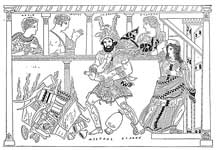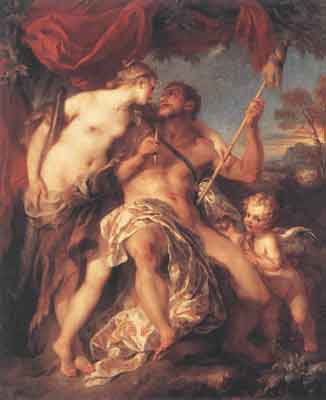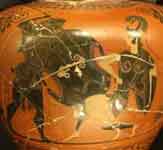.
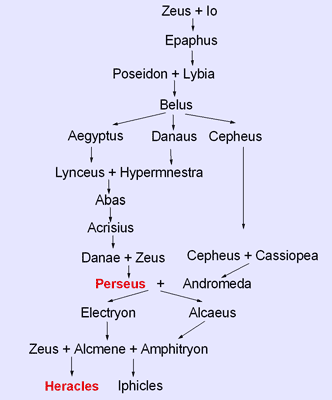
In Greek mythology, Heraklês or Heracles ("glory of Hera", Ἡρακλῆς) was the demigod son of Zeus and Alcmene, the grand-daughter of Perseus and the wife of Amphitryon. His original name was Alcides from his grandfather Alceus, a name derived from Alke (strenght, glory). The name Heracles he obtained after an advice from Delphi after he killed his children with Megara..
In Roman mythology he was called Hercules. He was, arguably, the greatest of the mythical Greek heroes, best known for his superhuman strength and many stories are told of his life. The most famous group of stories tell of The Twelve Labours of Herakles. His Etruscan equivalent was Hercle, a son of Tinia and Uni. He was also identified with Heryshaf (Egyptian mythology).
Curiously, in temples that were set up to praise Herakles, the priests wore female clothing, possibly connected to the myth of Omphale.
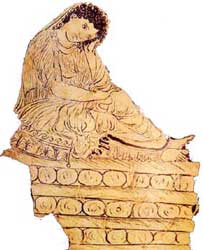
Alcmene
Heracles was a son of Zeus and Alcmene. A major factor in the tragedies surrounding Heracles stem from Hera's hatred of him; as the wife of Zeus she often hated his mortal offspring because they were living proof of Zeus' constant affairs, and she especially hated Heracles. While Alcmene was pregnant with Heracles, Hera, who was already informed of Zeus' adultery, persuaded Zeus to swear an oath on the night Heracles was to be born that the child born that night to a member of the House of Perseus would be High King. Once the oath was sworn, Hera hurried to Alcmene's dwelling and slowed the birth by sitting crosslegged with her clothing tied in knots. She would have permanently delayed the birth had she not been foiled by Galanthis, her servant, who told Hera that she had already delivered the baby. Hera turned her into a weasel and forced her to give birth by laying eggs through her mouth. Heracles was named in an unsuccessful attempt to mollify Hera. A few months after he was born, Hera sent two serpents to kill him as a he lay in his cot. Heracles throttled a single snake in each hand and was found by his nurse playing with their limp bodies as if they were child's toys. One account of the origin of the Milky Way is that Zeus had tricked Hera into nursing the infant Heracles: discovering who he was, she had pulled him from her breast, and a spurt of her milk formed the smear across the sky that can be seen to this day.
According to Greek tradition, probably based on Libanius, "Oration" XII, 99, or on the Epitome of the Library of Apollodorus, Heracles was conceived in the womb when Cronos, god of time, extended the night during his parents' nuptial. That miraculous event may have been a solar eclipse near daybreak, which took place on September 7, 1251 BC. It lasted from 6:51 to 9:41 in the morning at Sparta, with 75.9% magnitude. The Legend has it that Heracles was born in Thebes, Greece, where Alcmene and Amphitryon lived. The eclipse could well be visible there also.
Adulthood
He continued to perform feats such as slaying a lion that was preying on the local flocks and defending Thebes against a neighbouring army. For the latter he was awarded the King of Thebes' (Creon) daughter, Megara.
The Twelve Labours
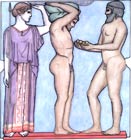
Image Source Color Reconstruction from an Australian Museum
Heracles and the Twelve Labours in the Olympia Zeus Temple ,
Stamps of Heracles, The twelve labours
Main Article:The Twelve Labours
In a fit of madness, induced by Hera, Herakles slew his wife and children, and as penance as told to him by the Delphic Sibyl, he was required to carry out ten tasks set by his arch-enemy, Eurystheus (who had become King in his stead). Herakles successfully carried them all out, but Eurystheus deemed that two of the tasks had been failed due to Herakles being helped, and allocated two more, which Herakles also completed, making 12.
Omphale and Heracles, Francois Lemyone, 1724
Omphale
Omphale was a queen or princess of Lydia. As penalty for a murder, Heracles was her slave. He was forced to do women's work and wear women's clothes, while she wore the skin of the Nemean Lion and carried his olive-wood club. After some time, Omphale freed Heracles and married him. Some sources mention a son fathered on Omphale who is variously named. For further details see Omphale.
It was at that time that the cercopes, mischievous wood spirits, stole Heracles' weapons. He punished them by tying them to a stick with their faces pointing downward.
Hylas
While walking through the wilderness, Heracles was set upon by the Dryopians. He killed their king, Theiodamas, and the others gave up and offered him Prince Hylas. He took the youth on as his weapons bearer and beloved. Years later, Heracles and Hylas joined the crew of the Argo. As Argonauts they only participated in part of the journey. In Mysia, Hylas was kidnapped by a nymph. Heracles, heartbroken, searched for a long time but Hylas had fallen in love with the nymphs and never showed up again. The ship set sail without them. Story of Heracles and Hylas
Iole
King Eurytus of Oechalia promised his daughter, Iole, to whoever could beat his sons in an archery contest. Heracles won but Eurytus abandoned his promise. Heracles killed him and his sons and abducted Iole.
Killing various giants
Heracles killed the giants Cycnus, Porphyrion and Mimas.
Laomedon/Tros
Before the Trojan War, Poseidon sent a sea monster to attack Troy.
Laomedon planned on sacrificing his daughter Hesione to Poseidon in the hope of appeasing him. Heracles happened to arrive (along with Telamon and Oicles) and agreed to kill the monster if Laomedon would give him the horses received from Zeus as compensation for Zeus' kidnapping Ganymede. Laomedon agreed.
Heracles killed both the monster but Laomedon went back on his word.
Accordingly in a later expedition Heracles and his followers attacked Troy and sacked it and slew all Laomedon's sons present there save Podarces, who saved his own life by giving Heracles a golden veil Hesione had made. Telamon took Hesione as a war prize; they were married and had a son, Teucer.
Other adventures
Heracles defeated the Bebryces (ruled by King Mygdon) and gave their land to Prince Lycus of Mysia, son of Dascylus.
He killed the robber Termerus.
Heracles visited Evander with Antor, who then stayed in Italy.
Heracles killed King Amyntor of the Dolopes for not allowing him into his kingdom. He also killed King Emathion of Arabia.
Heracles killed Lityerses after beating him in a contest of harvesting.
Heracles killed Poriclymenus at Pylos.
Heracles founded the city Tarentum (modern: Taranto) in Italy.
Heracles learned music from Linus (and Eumolpus), but killed him after Linus corrected his mistakes. He learned how to wrestle from Autolycus. He killed the famous boxer Eryx of Sicily in a match.
Heracles later participated in many other adventures. He was an Argonaut. He killed Alastor and his brothers.
When Hippocoon overthrew his brother, Tyndareus and killed Tyndareus' son, Lycon, as King of Sparta, Heracles reinstated the rightful ruler and killed Hippocoon.
Marriage, sex and death
Heracles had countless affairs with women. He naturally had a great many children from various women, collectively referred to as the Heracleidae (most notable: Macaria). One event that stands out was his stay at the palace of King Thespios, who liked his build and encouraged Heracles to make love to his daughters, all fifty of them, in one night. They all got pregnant and all bore sons. Many of the kings of ancient Greece traced their lines to one or another of these, notably the kings of Sparta and Macedon.
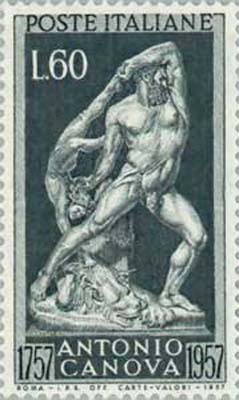
Heracles and Lichas, Antonio Canova 1796. Galleria d'Arte Moderna, Rome. Heracles angry that Lichas brought him a shirt with Nessus blood throws him into the sea.
During the course of his life, Heracles married three times. His first marriage was to Megara, whose two children he murdered in a fit of madness and whom he later gave in marriage to his companion Iolaus, because the sight of her was too painful. His second wife was Omphale, the Lydian queen or princess to whom he was sold as a slave. His last marriage was to Deianira, for whom he had to fight the river god Achelous. (Upon Achelous' death, Heracles removed one of his horns and gave it to some nymphs who turned it into the cornucopia.) Soon after they wed, Heracles and Deianira had to cross a river, and a centaur named Nessus offered to help Deianeira across but then attempted to rape her. Enraged, Heracles shot the centaur from the opposite shore with a poisoned arrow (from the Lernean Hydra) and killed him. As he lay dying, Nessus told Deianira that if she ever wanted to make sure of Heracles' love, she should gather up his blood and spilled semen and save them. Later, when Deianira suspected that Heracles was preferring the company of Iole, she soaked a shirt of his in the mixture. Heracles' servant, Lichas, brought him the shirt and he put it on. Instantly he was in agony, as the shirt burned into his flesh and ripped it from his bones. Heracles died a voluntary death, asking that a pyre be built for him to end his suffering.
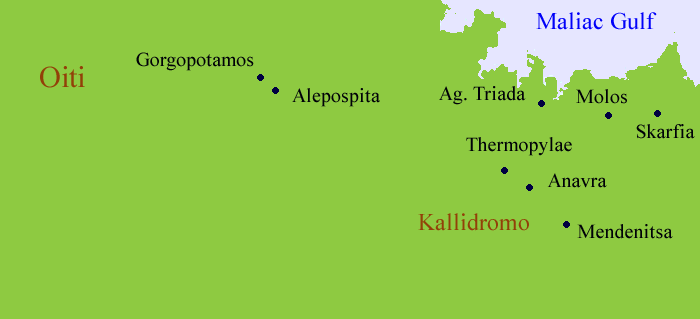
Mount Oeta (today Oiti or Iti) in Greece where Heracles died
After his death on the pyre the gods transformed Heracles into an immortal. He then married Hebe.
No one but Heracles' friend Philoctetes (in some versions: Iole or Poeas) would light his funeral pyre. For this action, Philoctetes (or Poeas) received Heracles' bow and arrows, which were later necessary for the Greeks to defeat Troy in the Trojan War.
Acca Larentia
In Roman mythology, Acca Larentia was Hercules' mistress. She was married to Tarutius, a wealthy merchant. When he died, she gave his money to charity. In another version, she was the wife of Faustulus.
Heracles' male lovers (eromenoi)
Plutarch, in his Eroticos, maintains that Heracles' male lovers were so numerous they were beyond counting. Here is a partial list:
Abderus (entrusted with - and slain by - the carnivorous mares of Thracian Diomedes. Hercules founded the city of Abderus in Thrace in his memory, where he was honored with games.)
Admetus (assisted in the hunt for the Calydonian Boar; also a beloved of Apollo, as per Plutarch and Callimachus)
Corythus
Elacatas (Spartan eromenos, honored there with a sanctuary and yearly games, according to Sosibius)
Euphemus
Hylas [1]
Iolaus (Theban, Heracles' nephew, helped him in many labors. Plutarch reports that down to his own time lovers and their beloveds would go down to his tomb in Thebes to swear an oath of loyalty to him.)
Iphitus
Jason (late mention, may be literary conceit)
Nestor (Loved him for his wisdom)
Nireus
Philoctetes (according to Martial. He is also heir to the hero's bow and is the one who lights his pyre. Later he is the initiator of Neoptolemus, son of Achilles.)
Phrix
(Collected by Bernard Sergent in Homosexuality in Greek Myth, Beacon Press, 1986.)
Modern and ancient intepretations
Via the Greco-Buddhist culture, Herculean symbolism was transmitted to the far east. An example remains to this day in the Nio guardian deities in front of Japanese Buddhist temples.
Later interpretations of Heracles' legend cast him as a wise leader and a good friend (many of the movie and TV adaptations cast him in this light, especially the recent syndicated TV series Hercules: The Legendary Journeys, and the movie Hercules). While he was a champion and a great warrior, he was not above cheating and using any unfair trick to his advantage. However, he was renowned as having made the world safe for man by destroying many dangerous monsters, and he was also held up as an example for never having attacked first, but for having conquered all merely by defending himself when attacked, and protecting the helpless and distraught. His self-sacrifice obtained Him the ascent to the Olympian realms and He was welcomed by the Gods. The legend of Heracles endures, though often co-opted to suit the political fashion of the day.
As a public domain character Hercules or Heracles have appeared in several comic book adaptations; see: Hercules (comics)
See also: sword and sandal (film genre); Maciste; The Sons of Hercules; The Mighty Hercules
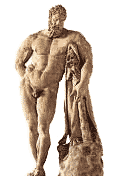
Herakles (Hercules) Farnese and why he needs your help!
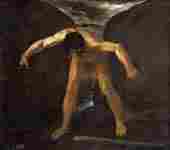
Hercules Separates The Mountains Calpe And Abyla
detail, red-figure lekythos: Hera suckling Hercules while Aphrodite and Iris look on; Greek, c. 360-350 BC, London, British Museum. Credits: Barbara McManus, 1986
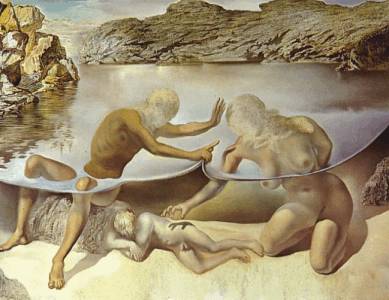
Hercules Lifts the Skin of the Sea and Stops Venus for an Instant from Waking Love, Salvador Dali, 1963
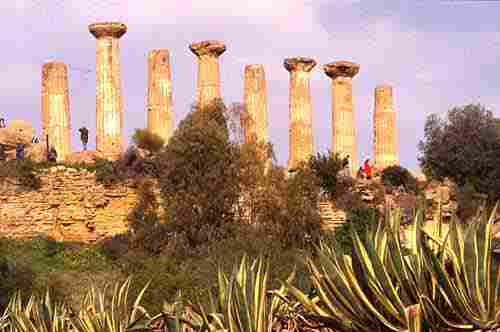
Temple of Heracles, Agrigentum (Akragas)
Herodotus, Book 2
The Greeks regard Hercules, Bacchus, and Pan as the youngest of the gods. With the Egyptians, contrariwise, Pan is exceedingly ancient, and belongs to those whom they call “the eight gods,” who existed before the rest. Hercules is one of the gods of the second order, who are known as “the twelve”; and Bacchus belongs to the gods of the third order, whom the twelve produced. I have already mentioned how many years intervened according to the Egyptians between the birth of Hercules and the reign of Amasis. From Pan to this period they count a still longer time; and even from Bacchus, who is the youngest of the three, they reckon fifteen thousand years to the reign of that king. In these matters they say they cannot be mistaken, as they have always kept count of the years, and noted them in their registers. But from the present day to the time of Bacchus, the reputed son of Semele, daughter of Cadmus, is a period of not more than sixteen hundred years; to that of Hercules, son of Alcmena, is about nine hundred; while to the time of Pan, son of Penelope (Pan, according to the Greeks, was her child by Mercury), is a shorter space than to the Trojan war, eight hundred years or thereabouts.

Nike-Hercules, an United States Army surface-to-air missile named after Hercules and Nike, used also by the Greek army
|
|
Links
- Timeless Myths - Heracles (http://www.timelessmyths.com/classical/heracles.html) The life and adventure of Heracles, including his twelve labours.
- Heracles, Greek Mythology Link
- Hercules on Coins
- Images of Heracles in Ancient Art
- Greek archaeologists unearth 'Hercules House', the birthplace of the Hero
- Schwarzenegger of California as Hercules in New York
- Polyxeni Potter, Ancient Myths and Avian Pestilence, Emerging Infectious Diseases • www.cdc.gov/eid • Vol. 11, No. 8, August 2005
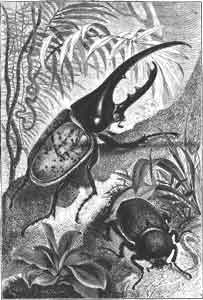
Hercules Beetle (Dynastes Hercules ), a rhinoceros beetle named by Linnaeus 1758 after Hercules
See also : Greek Mythology. Paintings, Drawings
| Ancient Greece
Science, Technology , Medicine , Warfare, , Biographies , Life , Cities/Places/Maps , Arts , Literature , Philosophy ,Olympics, Mythology , History , Images Medieval Greece / Byzantine Empire Science, Technology, Arts, , Warfare , Literature, Biographies, Icons, History Modern Greece Cities, Islands, Regions, Fauna/Flora ,Biographies , History , Warfare, Science/Technology, Literature, Music , Arts , Film/Actors , Sport , Fashion --- |
Retrieved from "http://en.wikipedia.org"
All text is available under the terms of the GNU Free Documentation License

